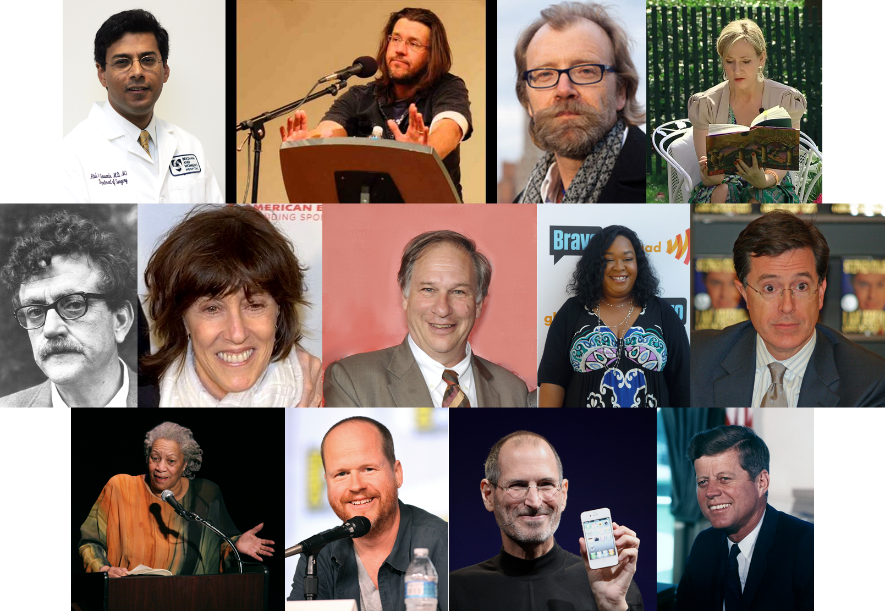What can we learn about leadership communication from famous commencement speeches?

Last commencement season, Business Insider posted a list of the 13 best graduation speeches of all time. While there will always be room for debate on that topic, we felt the list offered a strong collection of truly inspiring speeches — free of the clichés and platitudes we hear so often this time of year.
We wondered how top-rated commencement speeches compare to the typical executive keynote. What can a CEO take from these speeches into leadership communication scenarios?

We used our proprietary language analytics platform to measure the speeches from Business Insider’s list. It turns out there’s plenty our corporate leaders can learn from these iconic commencement addresses.
Building trust through confident, authentic language
Before speakers can even think about inspiring an audience, they must earn their trust. Two key elements of trust building are authenticity and confidence — giving the impression that you’re speaking as yourself and conveying the idea that you truly believe in your message.
The commencement speeches we measured outperformed the average executive keynote in both elements, coming across as 42% more authentic and 15% more confident.

In his speech to Wesleyan’s class of 2013, film writer and director Joss Whedon demonstrated high levels of authenticity:
“The only way really to understand your position and its worth is to understand the opposite. That doesn’t mean the crazy guy on the radio who is spewing hate, it means the decent human truths of all the people who feel the need to listen to that guy. You are connected to those people. They’re connected to him. You can’t get away from it.”
The language Whedon uses to address thousands of people is the same kind of language we can imagine him using in a one-on-one conversation, and that genuine tone goes a long way in earning his audience’s trust.
J.K. Rowling spoke to the 2008 Harvard graduates with incredible confidence, using concrete and insightful language to illustrate her deep-seated conviction about the power of overcoming adversity:
“The knowledge that you have emerged wiser and stronger from setbacks means that you are, ever after, secure in your ability to survive. You will never truly know yourself, or the strength of your relationships, until both have been tested by adversity. Such knowledge is a true gift, for all that it is painfully won, and it has been worth more than any qualification I ever earned.”
A speaker’s confidence is contagious. Once an audience perceives a speaker’s belief in his or her own message, they can begin to believe it, too.
Using clear and engaging language to keep the audience’s attention
Of course, all the confidence and authenticity in the world are essentially useless if a speaker doesn’t use clear and engaging language to help the audience internalize the message and connect to it.
Here again, our analysis found these iconic commencement speeches serve as an example to corporate leaders, measuring 81% clearer and 86% more engaging than the average executive keynote.

Steve Jobs’ 2005 address at Stanford University is remarkable for its clarity (among other things). His speech is divided into three personal stories, and he uses simple sentence structures and active verbs to guide the audience, step-by-step, through each.
“Today I want to tell you three stories from my life. That’s it. No big deal. Just three stories. The first story is about connecting the dots. I dropped out of Reed College after the first 6 months, but then stayed around as a drop-in for another 18 months or so before I really quit. So why did I drop out? It started before I was born.”
This clear, easy-to-follow language lays the foundation for an engaging speech. However, while Jobs scores well above average for engagement, author George Saunders’ 2013 address at Syracuse is the real standout. His personalized, emotionally charged language contributed to a speech that audiences could relate to and enjoy from beginning to end.
“So here’s something I know to be true, although it’s a little corny, and I don’t quite know what to do with it: What I regret most in my life are failures of kindness. Those moments when another human being was there, in front of me, suffering, and I responded . . . sensibly. Reservedly. Mildly. Or, to look at it from the other end of the telescope: Who, in your life, do you remember most fondly, with the most undeniable feelings of warmth? Those who were kindest to you, I bet.”
By inviting the audience to put themselves in his shoes, Saunders gives them the opportunity to truly internalize his message. Once an audience feels included in this way, they can more easily engage with the presentation, particularly one with such a compelling message.
In the corporate world, it’s easy to overlook university commencement addresses. After all, these are just lighthearted speeches designed to make a bunch of 20-somethings feel better about entering the real world. But perhaps that is exactly what makes so many of them exemplary. The very nature of the commencement speech allows the writers to think outside the constraints of a more traditional, professional presentation and speak more conversationally, more authentically.
So as you prepare for your next speaking engagements, think back to these commencement speeches. How can you incorporate these speakers’ clarity or confidence, or even their storytelling, into your leadership communications, to better connect with your audience? Whatever their age or standing, you can send them away inspired and engaged.
To find out how Quantified Communications can use communication analytics to help your organization craft best-in-class communications, email us at info@quantifiedcommunications.com.